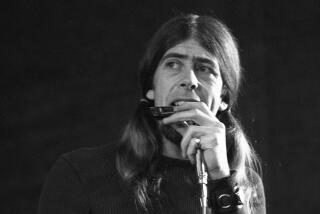SURF INSTRUMENTALS SEEN AS NEXT BIG WAVE
- Share via
CARLSBAD — After more than 20 years of musical hydrophobia, Paul Johnson is once again riding the wild surf on his trusty electric guitar.
He has formed a new band of rock ‘n’ roll hot-doggers, the Packards, and written several dozen new instrumentals inspired by the raging intensity of the early-morning surf.
Johnson’s goal is to rekindle interest in the surf-rock instrumental music of the early 1960s, a genre he and his old Los Angeles band, the Bel-Airs, helped define with their 1962 hit “Mr. Moto.”
“We’re out to broaden the popularity of surf music in particular, and instrumental rock ‘n’ roll in general,” said Johnson, who with the Packards will be playing tonight and Saturday at Winston’s in Ocean Beach and Sunday at the Belly Up Tavern in Solana Beach.
“When music took a serious turn in the middle 1960s, and all of a sudden everything had to have a message, instrumental music pretty much got swept away because it was no longer considered relevant,” he said.
“So what we’re trying to do now is restore some of that lost validity. We’re trying to reaffirm what people knew in the early 1960s: that simple instrumental tunes, even without a message, can still be lots of fun.”
It’s surf music. Real surf music. Forget about such cheery vocal groups as the Beach Boys or Jan and Dean, whose euphemistic renderings of Southern California’s surfing life style had every kid in Iowa yearning for his own board and bottle of zinc oxide.
“The Beach Boys, Jan and Dean, and others like them really didn’t have much of an audience among the actual surfers,” Johnson said. “If they had, they were liable to have stuff thrown at them.
“Mostly, they were looked upon as outsiders. Their music may have identified with surfing in theme, but it wasn’t really flowing from it the way ours was.”
Indeed, such popular surf-rock instrumentals from the early 1960s as “Wipeout,” “Walk Don’t Run” and “Mr. Moto” seemed almost to pulsate with the same energy, thrill and excitement of catching a 12-foot wave for the first time and riding it to shore without wiping out.
“Ironically, most of us musicians didn’t surf ourselves,” Johnson said. “We just happened to be playing for the beach kids when the whole surfing thing hit, and those kids somehow came to identify with us and with our music.
“I remember when people first called it ‘surf music’ because it was supposed to sound like what you hear when you’re out surfing.
“But that was the furthest thing from our minds. We were just playing instrumental rock ‘n’ roll like Duane Eddy, Link Wray and Johnny and the Hurricanes had been playing for years.”
From 1962 until 1964, the Bel-Airs experienced a fair amount of success. In Newport Beach, they headlined over the then-fledgling Beach Boys, and a short time later, their first single, “Mr. Moto,” became an even bigger hit for the Ventures.
But when U.S. rock music turned political in the middle 1960s with the influence of such electric-folk artists as Bob Dylan and the Byrds, words were in and instrumentals were out.
“Everything got so serious, so heavy,” Johnson said. “Like most of the other surf-rock bands, the Bel-Airs just gradually dissipated, one by one, until no one was left.”
After a year of working as a session musician on albums by Sonny and Cher, Bobby Sherman, and the Hondells, Johnson left Los Angeles in 1965 and moved to Mendocino.
“I totally dropped out,” he said. “I grew my hair and became a hippie, just trying to figure out what was going on in my life, what was going on in the world.”
In 1970, he became a born-again Christian and, for the next 10 years, worked with various social and charitable organizations throughout Northern California. He frequently played gospel music in duos or trios and spent hours studying “all sorts of other styles of music I hadn’t even known about before,” he said.
Seven years ago, Johnson, now 41, moved to Carlsbad, where he began working as a carpenter. A short time later, he and some friends cut an album of old surf instrumentals, “just for fun,” he said. They sent copies to a few music publications, and even took out a couple of ads.
“I couldn’t believe the response,” Johnson recalled. “I started getting letters from all over the world. It was real encouraging to find I still had an audience, so I decided to put a band together and basically take up where I had left off 15 years before.”
Several stumbles later, Johnson has released two critically acclaimed albums on the nationally distributed Frontline Records label, has been profiled several times in Guitar Player magazine, and has stabilized the personnel in his band to the point where, after a few more local dates, he’s ready to hit the road.
“Years ago, back in the middle 1960s, I always had the feeling that instrumental rock would come back,” Johnson said. “All it would take would be the right band, and the right songs.
“Now, I finally feel I’ve got both. So I’m ready to go out and build another fire.”
More to Read
The biggest entertainment stories
Get our big stories about Hollywood, film, television, music, arts, culture and more right in your inbox as soon as they publish.
You may occasionally receive promotional content from the Los Angeles Times.








